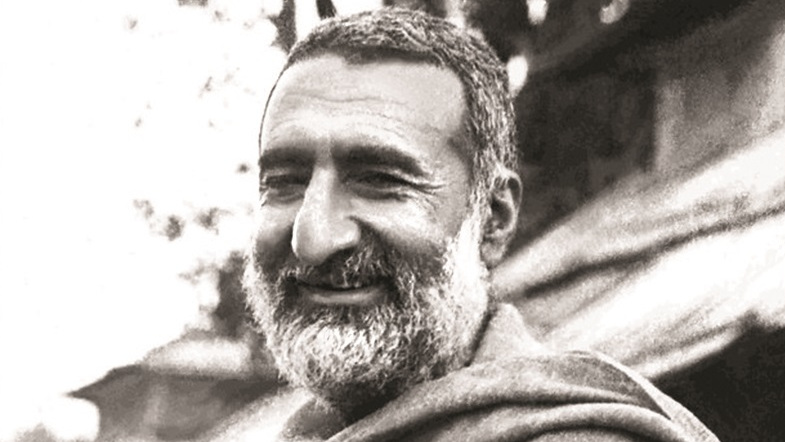Abdul Ghaffar Khan was a Pashtun nationalist, revolutionary, and Muslim social reformer from Peshawar. He founded the Khudai Khidmatgar or the “Servants of God” movement in 1921. The movement was committed to nonviolent resistance as a means to overcome British rule of India. Ghaffar Khan became known as the “Frontier Gandhi”.
In April 1930, Abdul Ghaffar Khan was arrested for leading an anti-British campaign and sent to Dera Ismail Khan prison. In 1937 he disobeyed British law by refusing food for two weeks on behalf of 22 other prisoners who were on hunger strike protesting against the condition of their incarceration and won their release in July 1938 with more than half emaciated or dying.
About Abdul Ghaffar Khan
Abdul Ghaffar Khan born on February 2, 1890 in the village of Pattan in the Khyber-Pakhtunkhwa Province (Pakistan) to a Pashtun family. In 1905 he became a follower of his elder brother, Khan Abdul Jabbar Khan. He took part in the Ghazali movement and was arrested for not paying taxes.
In 1920 Abdul Ghaffar Khan became the Deputy Superintendent of Police in Peshawar and successfully quelled a riot there. In 1921 he was jailed for 55 days for protesting for social reforms. On release, he began leading protest marches in support of tenant farmers who were being evicted by landlords. In 1923 his salary was reduced after an argument with his superior officer.
Life of Ghaffar Khan
His birth
Abdul Ghaffar Khan was born in 1890 at Utmanzai village of Peshawar, Khyber-Pakhtunkhwa to a Pashtun family. He was the youngest son of Abdul Ghafar. He belonged to a family that had produced several notable Islamic warriors during the 19th century, including his father and his four older brothers who were known as the “fighting pashtuns”.
His education
Abdul Ghaffar Khan was illiterate, as were many of his contemporaries. No schools existed in his village, Utmanzai, so he never attended one. The only education he received was at a mosque where a mullah taught him how to read the Qur’an and write in Pashto.
He was married when he was 13 years old to Karim Bibi. His wife died two years later during childbirth and Abdul Ghaffar Khan took the newborn girl with him and named her Bacha Khan after his mother’s tradition.
His personal life
In Peshawar, Abdul Ghaffar Khan married again and had two sons, Abdul Wali Khan and Abdul Ali Khan. His son Wali Khan became a politician in Pakistan.
His legacy
Abdul Ghaffar Khan is considered one of the greatest Pashtuns who ever lived due to his strong commitment to both Islam and Pashtun nationalism. He was given the title of Sher-e-Bangalah or “the lion of Bengal”. He was nicknamed “Frontier Gandhi” because of his inspiration to Mahatma Gandhi and other major Indian leaders such as Jawaharlal Nehru in their efforts at achieving independence through nonviolence resistance against the British Empire.
Career
Abdul Ghaffar Khan was an accounts officer in the Peshawar District. He resigned shortly after a disagreement with his superior officer, Major Wilson. In 1922, he became the Deputy Superintendent of Police in Peshawar. That same year, he arrest for leading an anti-British campaign and sent to Dera Ismail Khan prison where he spent ten months. After his release, he refuse to pay taxes so jail for 50 days in 1924 and receive his first salary cut because of this.
In 1927 Abdul Ghaffar Khan led another protest protesting against a forced vaccination program. He imposed a tax on farmers which helped bring about the end of forced vaccinations by offering financial incentives for farmers who did not comply with the program’s demands.
Khudai Khidmatgar
In 1928, Abdul Ghaffar Khan formed the Khudai Khidmatgar or “Servants of God” movement. The name chose so that it could be understand by the poorest, most illiterate and uneducate people in all of India. The movement’s goal was to free India from British colonial rule as a nonviolent means to restore democracy and freedom.

Abdul Ghaffar Khan set up his first camp at Purano Daro near Bannu in 1929 with 30 other men. He urged them to join him by stressing that they would need strength of character and courage to face death rather than yield to the British Empire, which he compared to a tiger that had crushed countless villages with which it had unsuccessfully fought wars throughout history.
Kissa Khwani massacre
Abdul Ghaffar Khan and his followers’ first major confrontation with the British army was on 16 February 1932. 31 unarm protestors shot and 34 wound by British soldiers in what became known as the “Kissa Khwani incident”. This result in the death of 21 people.
Throughout his life, Khan was oppose to violence for any reason. He was a fervent follower of Ahmadi Muslims who he said gave him “great strength” and a sense of purpose by their example of nonviolence. His philosophy is that nonviolence can only be effective if it is practice by everyone.
He had one condition for joining his movement: A promise to be a non-political force with no connection to political parties, religious orders or organizations.
Indian National Congress
When the Mahatma toured India to collect donations for his fight for independence, Abdul Ghaffar Khan and his followers attended in a show of support. When Gandhi returned to India after his first non-violent campaign against the British, he met with Khan in April 1930. He said; “You are my brothers and I am your leader”.
In 1937 Abdul Ghaffar Khan was imprison due to refusal to pay taxes. He refused food for 22 days until the British released him on July 1938 after he had lost over half of his body weight in prison or suffered from malnutrition.
Khan’s religious movements
In 1937, Abdul Ghaffar Khan was arrest on charges of sedition when police found weapons hidden in his home. He was arrest again in 1940. Despite this, he continued to protest nonviolently with his followers.
Abdul Ghaffar Khan was imprison by the British several times: In 1929, 1931 to 1932, 1940 and 1942 to 1945. This resulted in the arrest of other members of his movement and created a government sponsored backlash against him and his followers.
His Nonviolence Movement
In 1938 Abdul Ghaffar Khan form a large camp at Nowshera for his followers who were call Khudai Khidmatgar or “Servants of God.” The movement expanded throughout the Indian sub-continent when Khan’s two sons began leading groups in Lahore and Mardan. These groups were call “citizen’s armies”.
Nonviolence, the backbone of the movement, was consider an effective way for people to confront the British empire over its imperial policies in India.
Abdul Ghaffar Khan faced many challenges to his nonviolence ideology. One by one he faced and defeated them by showing his followers how his ideology worked in practice.
The British feared that Khan and his followers were gaining too much popularity among the people of India so they arrested him on charges of sedition in 1937. However, he refused to use violence against guards. While he was imprison until he was release on July 1938 after 22 days without food. Therefore, this made him a hero in India. Within his own movement because they saw that through nonviolence he had conquered his enemy.
Awards and Honor
Abdul Ghaffar Khan got award by Bharat Ratna by Indian government in 1987.
Khan died on 20 January 1988 in Peshawar, Pakistan. He is burry in his house (Bacha Khan House) in Jalalabad, Afghanistan.
The first memorial to Khan was built in Peshawar by the Afghan government. However, that replace the communist regime of Mohammad Najibullah after it was topple during the civil war. A committee overseen by Chief Minister Akram Khpalwak is planning a more elaborate monument to be complete later this year. After a $1 million donation from an anonymous donor in Pakistan.
A large shrine was built for him at his birthplace in 1927 and eventually convert into a museum.



